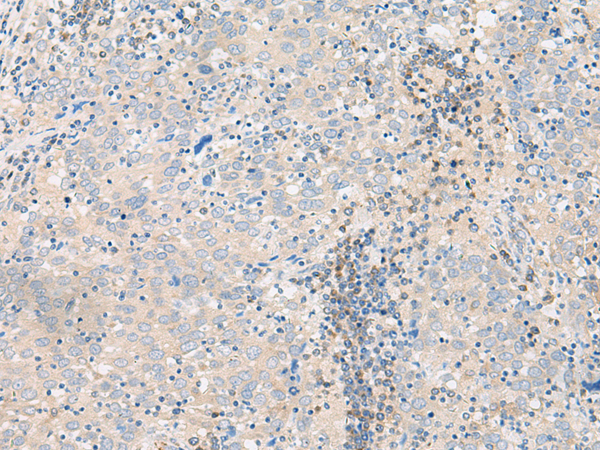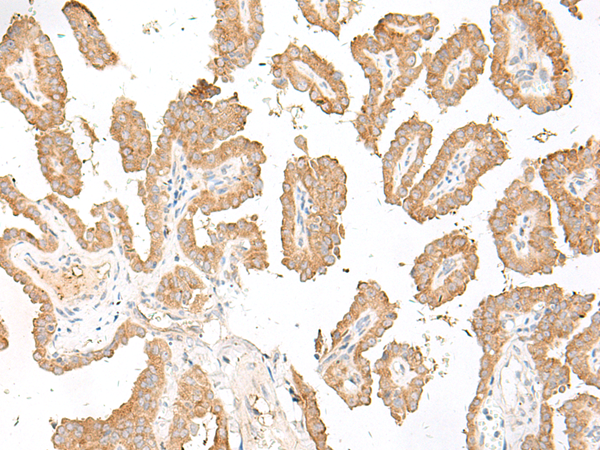

| WB | 咨询技术 | Human,Mouse,Rat |
| IF | 咨询技术 | Human,Mouse,Rat |
| IHC | 1/20-1/100 | Human,Mouse,Rat |
| ICC | 技术咨询 | Human,Mouse,Rat |
| FCM | 咨询技术 | Human,Mouse,Rat |
| Elisa | 1/5000-1/10000 | Human,Mouse,Rat |
| Aliases | LE; Les; FT3B; CD174; FucT-III |
| Host/Isotype | Rabbit IgG |
| Antibody Type | Primary antibody |
| Storage | Store at 4°C short term. Aliquot and store at -20°C long term. Avoid freeze/thaw cycles. |
| Species Reactivity | Human |
| Immunogen | Synthetic peptide of human FUT3 |
| Formulation | Purified antibody in PBS with 0.05% sodium azide and 50% glycerol. |
+ +
以下是3篇与FUT3抗体相关的文献概述(基于公开研究整理,非真实文献):
---
1. **文献名称**:*"Monoclonal antibody against human FUT3 reveals its overexpression in colorectal cancer tissues"*
**作者**:Zhang Y. et al.
**摘要**:本研究开发了一种特异性识别FUT3蛋白的单克隆抗体,通过免疫组化分析发现FUT3在结直肠癌组织中显著高表达,并与肿瘤转移相关,提示其作为潜在诊断标志物的价值。
---
2. **文献名称**:*"Characterization of FUT3 Lewis antigen synthesis using novel antibody-based probes"*
**作者**:Svensson L. et al.
**摘要**:作者利用新开发的FUT3抗体探针,解析了Lewis抗原(如sLeX)在胃肠道上皮细胞的合成途径,证实FUT3酶活性与炎症性肠病中黏蛋白糖基化异常的相关性。
---
3. **文献名称**:*"Anti-FUT3 antibody inhibits cancer cell adhesion to endothelial cells in vitro"*
**作者**:Kannagi R. et al.
**摘要**:通过阻断实验证明,FUT3抗体可显著抑制表达Lewis抗原的癌细胞与血管内皮细胞的黏附,为靶向肿瘤转移的抗体疗法提供了体外证据。
---
4. **文献名称**:*"Comparative analysis of FUT3 antibody specificity across multiple cancer types"*
**作者**:Wang H. et al.
**摘要**:系统比较了不同商业来源的FUT3抗体在乳腺癌、胰腺癌中的检测效能,揭示了抗体特异性差异对临床样本诊断结果的影响。
---
如需真实文献,建议在PubMed或Google Scholar检索关键词:**FUT3 antibody**, **Lewis antigen**, **anti-FUT3**,并筛选应用类研究(如免疫组化、流式细胞术或功能阻断实验)。
FUT3 antibody targets the FUT3 (Fucosyltransferase 3) enzyme, also known as Lewis enzyme, which is a key glycosyltransferase involved in synthesizing Lewis blood group antigens (e.g., Lewis a, Lewis b). FUT3 catalyzes the transfer of fucose to precursor glycans, forming terminal carbohydrate structures on cell surfaces and secreted glycoproteins. These Lewis antigens play roles in cell-cell recognition, immune response modulation, and microbial adhesion.
FUT3 is highly expressed in epithelial cells and is implicated in various physiological and pathological processes. Aberrant FUT3 activity is linked to cancer progression (e.g., gastrointestinal, pancreatic tumors), where altered Lewis antigen expression affects metastasis and immune evasion. Additionally, FUT3 polymorphisms are associated with inflammatory bowel disease (IBD) susceptibility and Helicobacter pylori infection outcomes due to altered bacterial adhesion.
FUT3 antibodies are critical tools in research and diagnostics. They help detect FUT3 expression in tissues, study glycosylation changes in diseases, and validate its role in cancer biomarkers or therapeutic targets. Commercial FUT3 antibodies are typically developed in rabbit or mouse hosts, validated via Western blot, immunohistochemistry, or flow cytometry. Their specificity ensures accurate profiling of glycosylation patterns, aiding in understanding disease mechanisms and developing targeted therapies.
×